Learn how to hard boil fresh eggs that turn out perfectly every time, in just a few simple steps! Say goodbye to green yolks forever.
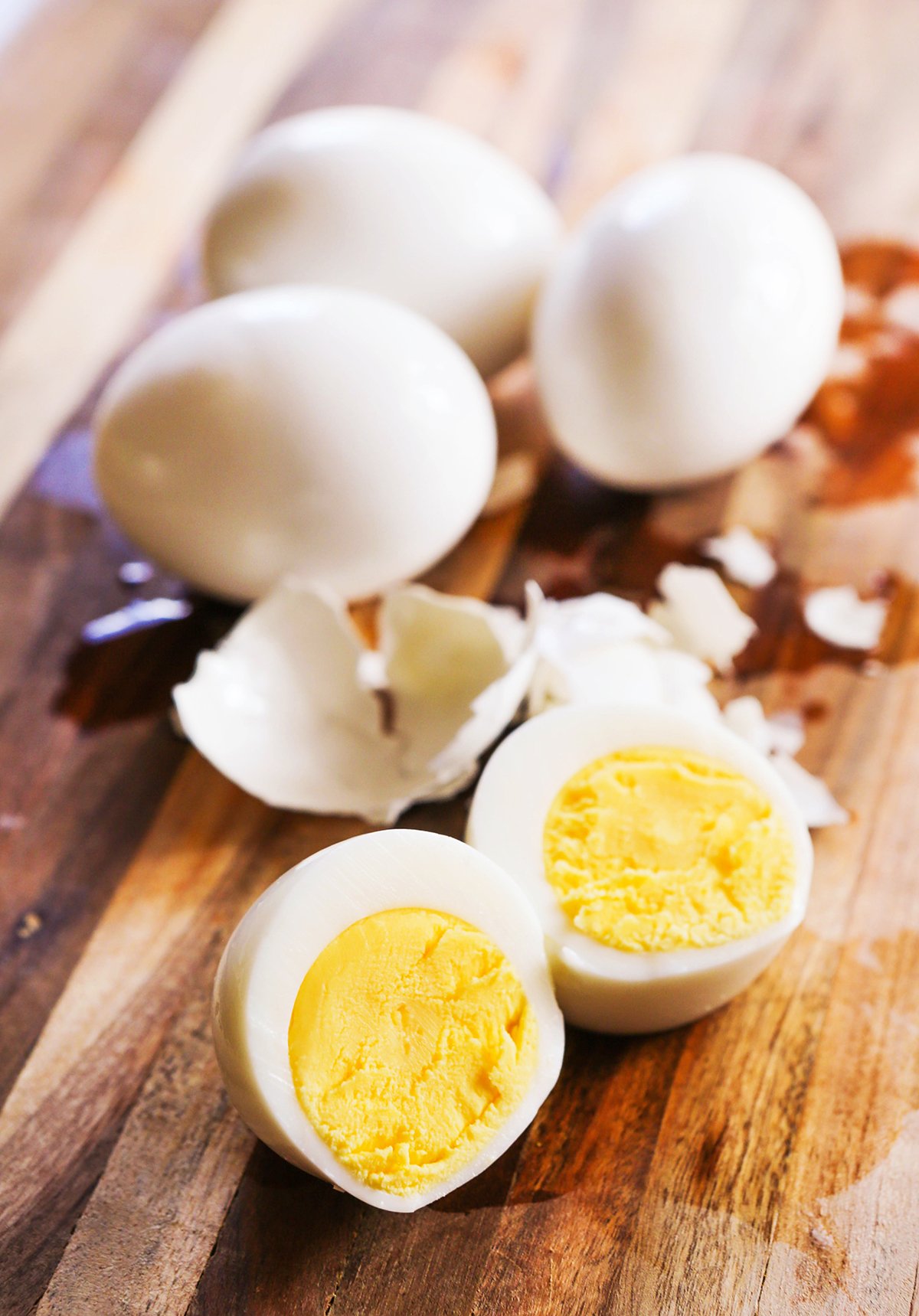
Original post: September 2010 | Updated: January 2023
Why This Recipe Works
Hard boiling eggs was one of the first cooking tricks I taught myself. They are good to use in many different recipes or just to eat as a delicious, healthy snack!
We’ve all eaten eggs that have been boiled for far too long, with a green ring lining a hardened yolk. <<— I only had to experience that situation once or twice before I set out on a quest to make the most perfect hard-boiled egg I could make.
This is the best method for learning how to hard boil fresh eggs easily and consistently. Follow the step by step instructions below to make the perfect hard boiled egg every time! The instructions below work for farm-fresh eggs, as well as raw eggs purchased at the grocery store.
How To Hard Boil Fresh Eggs
Step 1 – Place Eggs in Water
Place large eggs in a single layer on the bottom of a saucepan filled with cool water. There should be 1 inch of water above the top of the eggs.
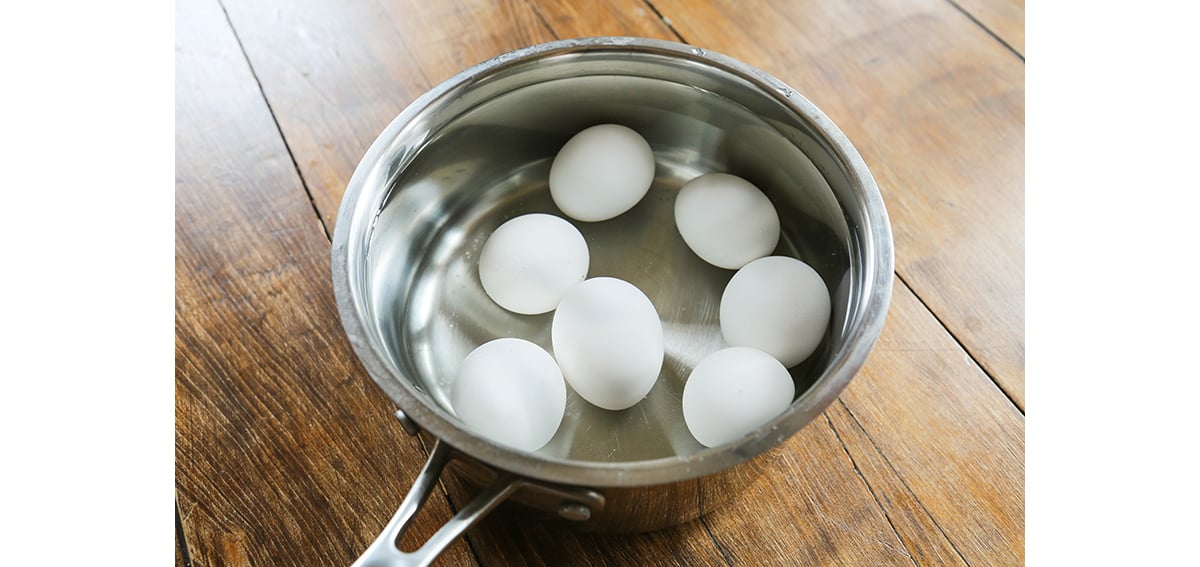
Step 2 – Bring To A Boil
Bring the water to a rolling boil over high heat.
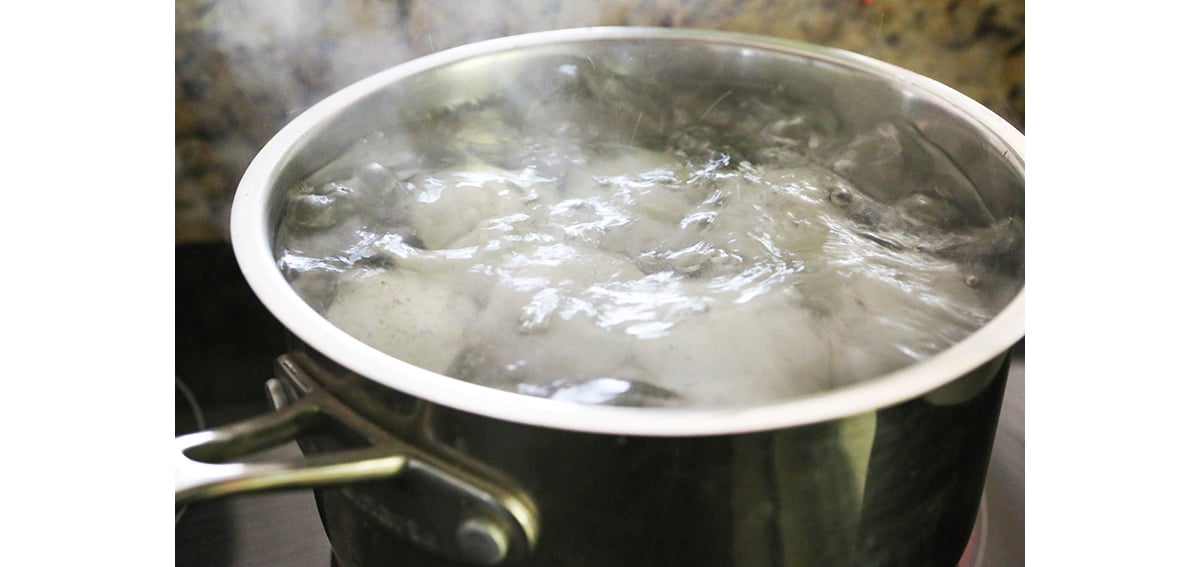
Step 3 – Remove From Heat and Cover
The water should come to a full boil, then immediately turn it off. Move the pan from heat source and place a cover on top. Set a timer for 15 minutes for the cooking process to finish. Even though the eggs aren’t over a direct heat source at this point, they are still cooking in the covered pot of hot water.
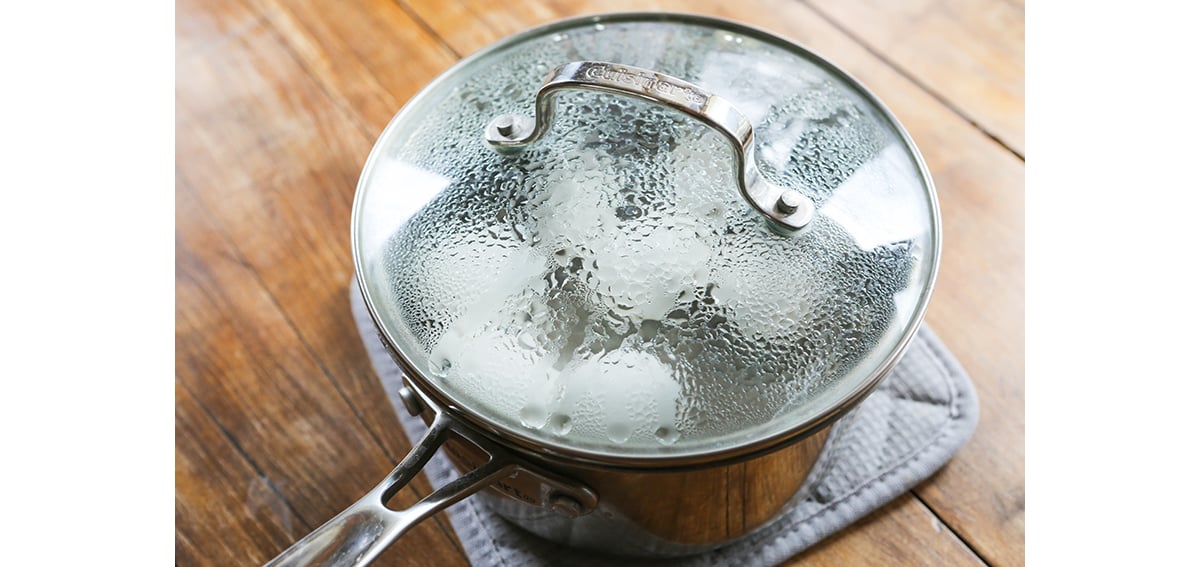
Step 4 – Place Eggs In Ice Bath
Prepare an ice bath by taking a bowl and filling it with ice cubes and a little water. When the timer goes off, use a slotted spoon to transfer the eggs out of the hot water into the bowl of ice cold water immediately for rapid cooling.
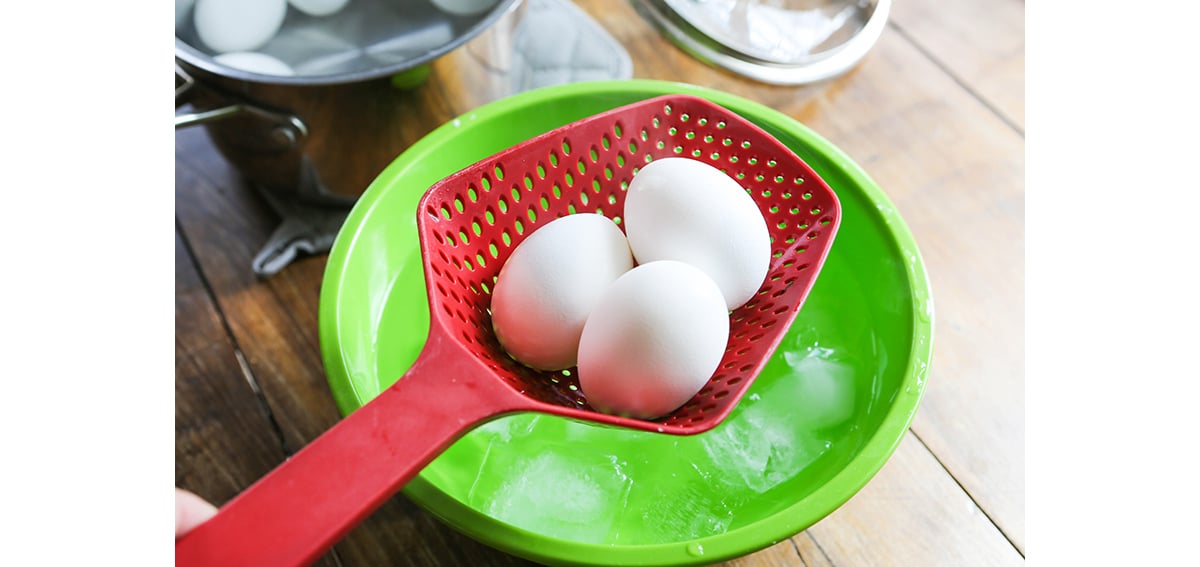
Allow the eggs to sit in the ice water bath for a minute or two.
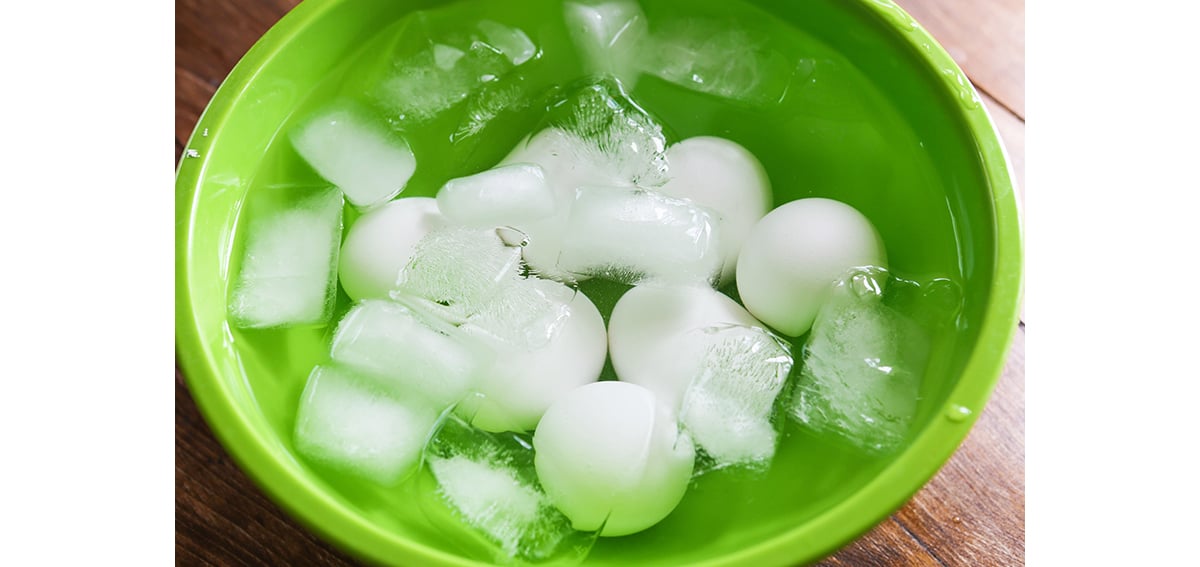
Alternatively, you may run the eggs under cold water if you don’t want to make an ice bath. The eggs need to stop cooking and the way to do that is to expose them to sudden cold, whichever route you go.
Step 5 – Peel or Refrigerate
At this point the eggs are perfectly hard-boiled underneath their shells. Either peel the eggs immediately or refrigerate without peeling.
Recipe Notes
- Peeled eggs will stay fresh in the fridge for 5 days.
- Super-fresh eggs will always taste better than older eggs, no matter how they are cooked. Farm fresh eggs will always be more fresh than store bought eggs.
- Unpeeled hard-boiled eggs will stay fresh in the fridge for 7 days.
- If you have a pressure cooker, try making your next batch of hard-boiled eggs in an Instant Pot. No more difficult-to-peel hard-boiled eggs with this recipe!
- Use eggs straight from the fridge! No need to bring them to room temperature before boiling them.
- For easy peel hard boiled eggs, remove the peels immediately after they’ve been cooked.
What To Do With Hard Boiled Eggs
- Slice or chop hard boiled eggs and throw them into your next chopped salad!
- Make a batch of deviled eggs for your next gathering.
- Add them to potato salad.
- Turn them into colored Easter eggs!
- Eat as a healthy snack, with a sprinkling of salt and pepper.
- Hand them to family members who need a delicious on-the-go breakfast.
- An egg salad sandwich is the perfect way to use up hard-boiled eggs. Spread on a piece of toasted bread, load up a brioche bun with your mayonnaise and egg mixture or put it on an English muffin.
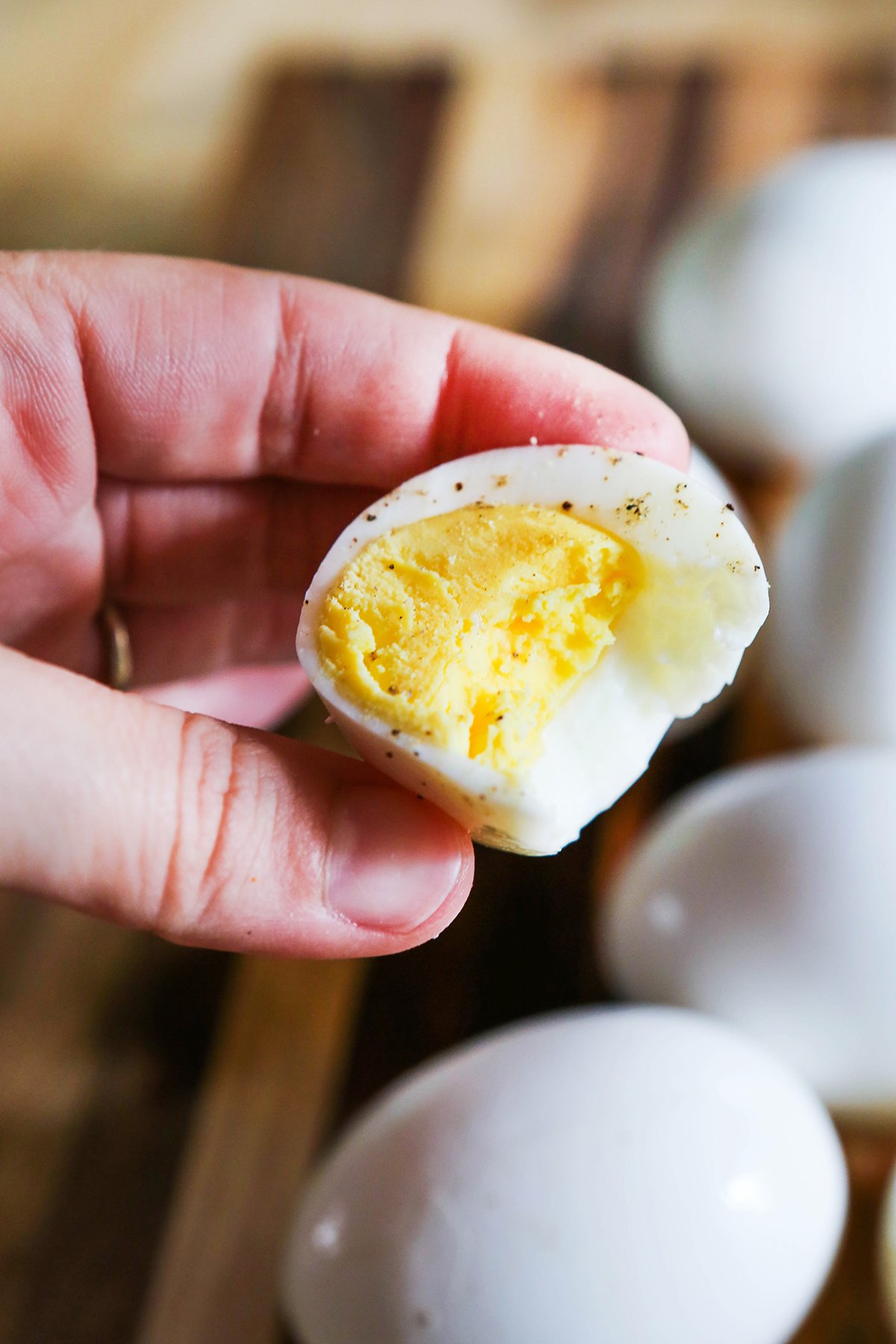
Are Overcooked Hard Boiled Eggs Safe To Eat
Overcooked hard boiled eggs are safe to eat, as long as they are consumed within a week of cooking. Although safe, they may have a rubbery texture that leaves much to be desired.
How To Reheat Hard Boiled Eggs
Reheat hard-boiled eggs that have peels intact by adding them to a medium heat-proof bowl. Bring 4-6 cups of water to a boil on the stove. Add the boiling water to the boil, ensuring there is enough water so the eggs are submerged.
Place a cover over top of the bowl and set a timer for 5 minutes. Peel fresh eggs and enjoy them warm!
Reheat hard-boiled eggs that have already been peeled by placing them on a microwave-safe dish. Loosely cover and microwave on high in 30-second intervals or until heated through.
How To Freeze Hard Boiled Eggs
The white portion of hard-boiled eggs do not freeze well. Once thawed, the whites have a watery texture that wasn’t there before freezing.
Yolks do freeze well! Transfer hard-boiled yolks to an airtight container or freezer bag for up to 4 months for best results.
FAQ About Eggs
A hard-boiled egg is cooked so that the egg white and egg yolk both solidify. On the flip side, soft-boiled eggs may have a yolk and the white partially liquid and raw.
Eggs can be used 5 weeks after the sell date listed on the carton. The sooner they are used, the fresher they will be.
1 large egg contains approximately 72 calories.
1 large egg contains approximately 6 grams of protein.
1 large egg contains approximately 0.6 grams of carbohydrates.
Yes, dogs can eat eggs because when cooked thoroughly, eggs are a nutritious and delicious snack for dogs. They are even sometimes used to help settle digestive systems for canines.
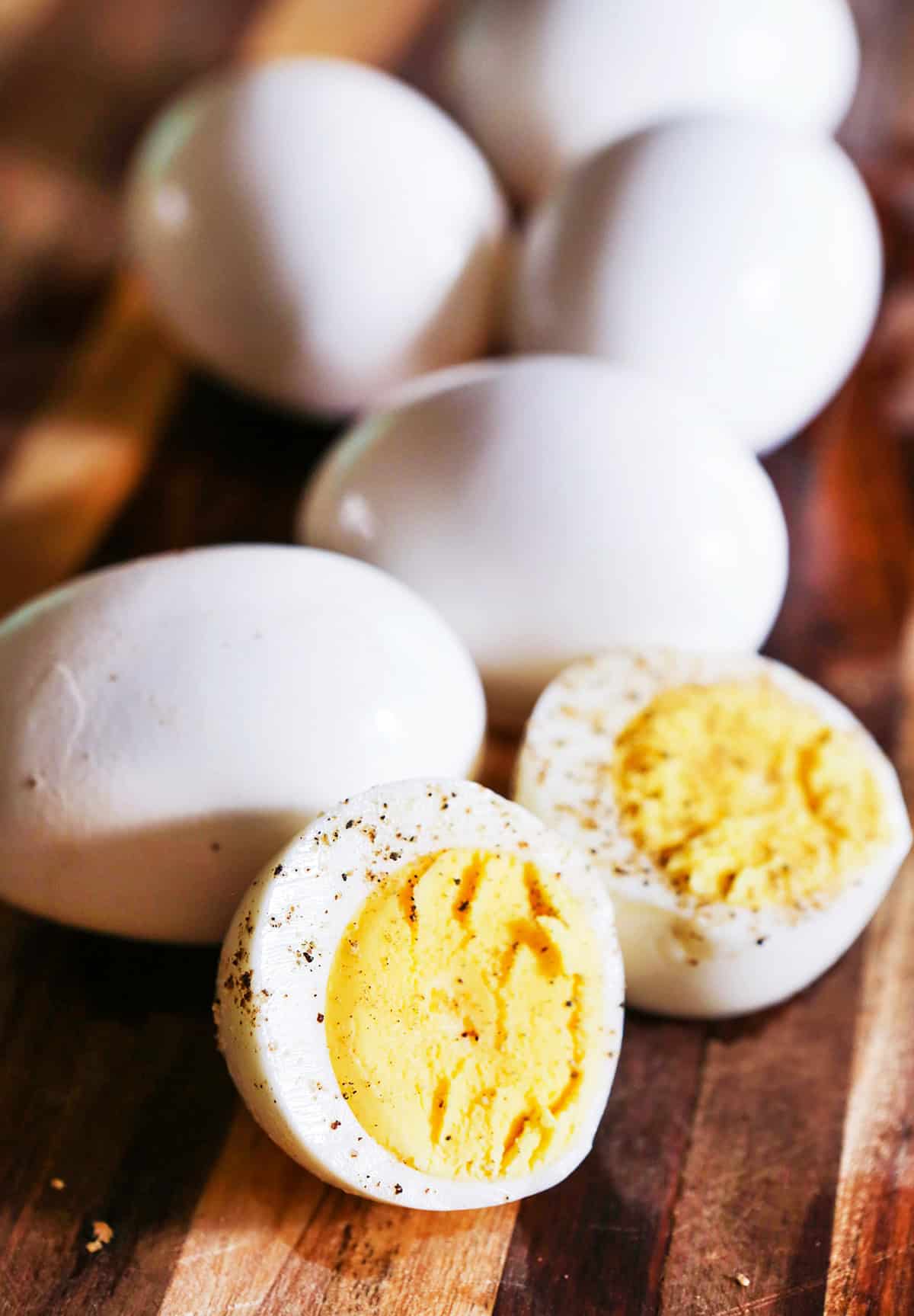
What To Serve For Brunch
- Homemade Bagels are mad using only 5 ingredients and in 20 minutes from start to finish! NO YEAST or rising or waiting required.
- You have just met your new go-to Blueberry Muffin recipe! These muffins turn out great every time, they are moist and totally packed with blueberries.
- Breakfast Pizza – Like brunch itself, this recipe is a combo of two types of meals, making it the perfect brunch fare. Pizza combined with eggs, spinach, bacon and goat cheese? Yes, please!
- I have been making (and perfecting) this Breakfast Casserole for YEARS and it is one of my all-time favorite breakfast foods. This is perhaps my favorite thing ever to make for brunches.
Will you help add value to Pip and Ebby?
If you make this recipe and love it, stop back and give it a 5-star rating ⭐️⭐️⭐️⭐️⭐️ and leave a comment. THANK YOU!
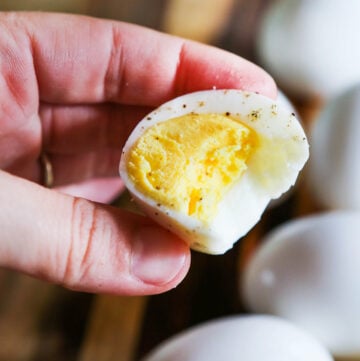
How To Hard Boil Eggs For Easy Peeling
Ingredients
- 6 eggs or as many as you need to hard boil, as long as they stay in a single layer in the bottom of the pan
Instructions
- Place desired amount of eggs in a saucepan (use as many as you want as long as they remain in a single layer) filled with water. The water should reach approximately 1 inch above the tops of the eggs.
- Bring the water to a rolling boil over high heat. Immediately remove the pan from heat source and place a cover on the pan. Set a timer for 15 minutes.
- A couple minutes before your timer beeps, prepare an ice bath. Transfer the eggs to the ice bath.
- Let the eggs sit in the ice bath for a minute or two. You can skip this step if desired and instead run the eggs under cold water. It is important that the eggs stop cooking and the way to do that is to expose them to sudden cold, whichever route you go.
- At this point your eggs are perfectly hard-boiled underneath their shells. Either peel immediately or refrigerate without peeling.
Notes
- Hard-boiled eggs that have been peeled, will stay fresh in the fridge for 5 days.
- Unpeeled, hard-boiled eggs will stay fresh in the fridge for 7 days.
- Please don’t try freezing eggs once they’ve been boiled because they will become tough and rubbery. The yolks can be harvested and frozen for later use.
- If you have a pressure cooker, try making your next batch of hard-boiled eggs in an Instant Pot!
- Use eggs straight from the fridge! No need to bring to room temperature first.
- It is easier to peel hard-boiled eggs immediately after they’ve been cooked.
- Use older eggs that have been sitting in the fridge longer to make your hard boiled eggs because they tend to be easier to peel once they’ve been in the hot water.


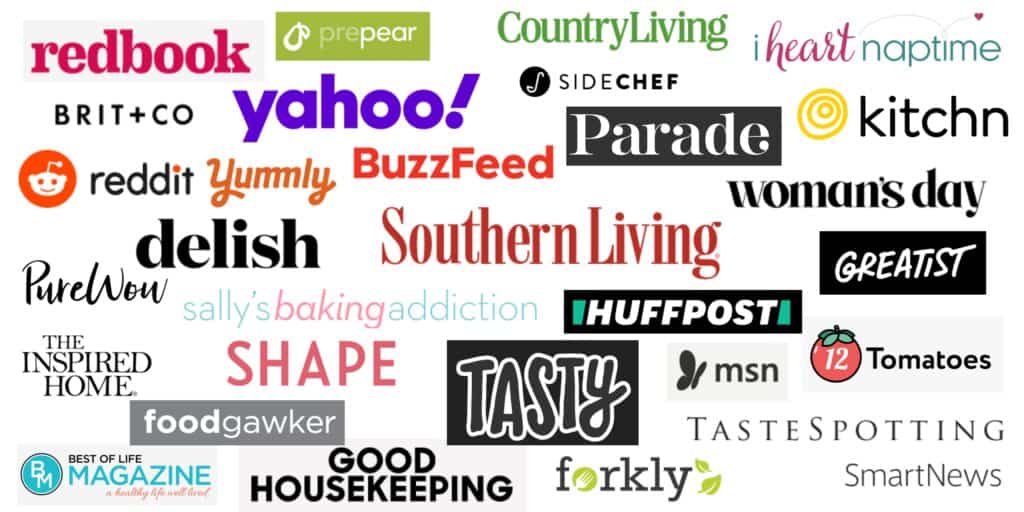
Leave a Reply